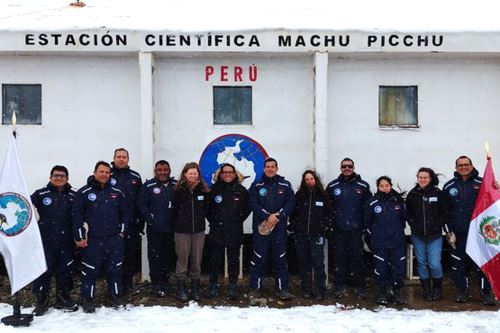The First Phase of the 31st Peruvian Scientific Expedition to Antarctica (ANTAR XXXI), which began on December 4, 2024, successfully concluded on January 11, with activities taking place on two research platforms: the BAP Carrasco and the Machu Picchu Antarctic Scientific Station.
During this stage, 7 national projects were carried out by the Peruvian Sea Institute (2), the National Agrarian University of La Molina (3), and the San Ignacio de Loyola University (2).
Additionally, scientific collaboration occurred in 4 projects with the Argentine Antarctic Institute (1), the Belgian Science Policy Office (BELSPO) (2), and the German Alfred Wegener Institute (2).
It is worth noting that a Peruvian junior researcher participated in each international project, which strengthened global ties in Antarctic scientific research and the training of new Peruvian scientists in Antarctic affairs.
Also participating in this phase were Chief Scientist of the Antarctic Affairs Directorate and ANTAR Coordinator, Pablo Londoñe; and Legal Advisor to the Antarctic Affairs Directorate at the Ministry of Foreign Affairs, Mishell Vidal. Both served as representatives of the Ministry of Foreign Affairs during ANTAR XXXI.
The result of this stage provides important advancements in research on biodiversity, climate change, bioprospecting, among others.
Samples were collected at Mackellar Inlet, Bransfield Strait, and Znosko Glacier.

The studies conducted during this phase will contribute to the global understanding of climate change impact, particularly on the Peruvian sea, as well as the effects of human presence in Antarctica, and the great possibility of isolating and obtaining new bioactive compounds that can be used in health and industry.
These joint efforts have advanced knowledge of this natural laboratory and its vulnerability to climate disruption.
International cooperation remains essential to address global environmental challenges, consolidating Peru's commitment to science and Antarctica preservation for future generations.
On January 7, Phase II of the 31st Peruvian Scientific Expedition to Antarctica began, a geological cruise focused on continuing research.
The main studies include toxicological analyses on the effects of emerging contaminants on oxygen consumption and the molecular physiology of krill, among others.
Lastly, this effort reflects Peru's commitment to scientific research and Antarctica preservation. It strengthens global cooperation ties to address environmental challenges on a key continent for studying climate change and ocean health.
The expedition not only seeks to generate valuable knowledge, but also to contribute to the development of conservation and protection strategies to ensure a sustainable future for Antarctica and its ecosystems.
(END) NDP/JCR/MVB
Published: 1/19/2025